 Mural, Dowtown, St. Petersburg, FL Mural, Dowtown, St. Petersburg, FL Writers invest a lot of time learning their craft. We study books and blogs and attend talks by authors, editors, agents and teachers, all in an effort to write better stories. We hear pretty much the same advice from everyone: Show,Don't Tell Never Open Your Book With A Dream Avoid Backstory Whenever Possible Shun Passive Verbs Balance Dialog, Action and Internality Get Rid Of Adults (for children's writers) We listen. We take their advice to heart. We work to present dramatic stories with dynamic verbs and sparse backstory. We avoid sleeping scenes with even a hint of a dream. Then apologizing to our beloved parents, we kill off the adults. We advise our critique partners to attack every instance that doesn't follow the rules and we slash the offending sections. So, it's with utter dismay that we pick up the latest award-winning novel and discover it opens with a dream and pages and pages of backstory, or the author uses to-be verbs in every other sentence, or most of the story focuses on adults. I used to frown at these books, scratch my head. Fellow writers and I would discuss the mystery. How did these books get published when they break the rules we've been taught? What I've come to understand is that great books tell a great story. Period. Readers don't know the rules and they don't care. And when it comes right down to it, neither do publishers. No doubt, they want writers to know their craft. They want them to write the best book they can with bonus points for beautiful language and style. But compelling story and voice is what sells books. When I was an art student, we were told, learn the rules, then you can break them. So that's my advice to new writers. Study, learn the rules and apply them. Practice, practice, practice. But don't ever let rules get in the way of your creativity. When you write a first draft, kick them out of your head and let the story flow. Focus on what makes your story original. Run wild with its uniqueness. Tell it the way only you can. The rules will be waiting in your handy dandy toolbox when you revise. Apply them with care, where needed. They should always make your story better. If not, put them aside.
0 Comments
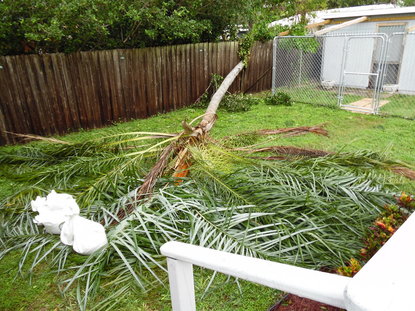 twinkiesNative Floridians aren't easily distracted by nature. We grow up with a variety of amphibians and reptiles, including alligators, over 12,000 insect species and forty-four snake species. We learn early on to leave gators be. Don't feed them, for crying out loud, unless you want them knocking on your door and looking at your fingers as if they're Twinkies! We know which snakes and bugs are poisonous and we learn to get along with them all. It's their planet, too, and they'll likely be here long after we're gone. I'm always surprised at newcomers who are disgusted by lizards. I think they're cute. We're used to hot, humid weather that melts ice cubes before they've had a chance to chill your drink. Daily thunder storms with booming lightning don't stop Floridians from going about their business. When I was a little girl, we invited the family to our house during hurricanes. The kids played games. I don't remember what the adults did but it seemed everyone had a good time and the next day, we picked up and moved on. Writers are a lot like Floridians. We don't let much distract us from our work. Even when we stop typing, we're figuring out story in our heads. We do it while driving, doing chores, waiting in lines and sometimes when we're supposed to be listening to the person next to us. Work isn't nine to five for us and storytelling isn't just a job, it's a mission. Two weeks ago a storm called Irma headed to Florida with her eye set on Tampa Bay. I imagine every writer in the state stopped writing like I did, to watch that storm on the news. It was a monster, wider than the state, chewing up the islands below us and leaving devastation behind. Now that I'm grown, I take hurricanes seriously. And from the sounds of it, so do most Floridians, including the children's writing community. Thousands listened to the dire warnings and evacuated. The people who stayed behind searched for a safe place to ride out the storm. We boarded our windows and doors, filled our cars with gas and our cupboards with canned food and water. Neighbors helped neighbors and wished each other well before heading inside to sit awake all night, listening to Irma batter our houses. On Facebook, the children's writing community lit up with offers of help and thoughts for everyone's safety. After Irma passed, Floridians cleaned up downed trees and smashed fences. They sweated in houses that no longer had electricity. Some faced destroyed homes and a long road back to normal. The writers in my group struggled to drag their thoughts back to their stories. A statewide series of workshops was postponed and a contest deadline extended. But we will recover, and we won't have to do it alone. The children's writing community supports its members. Lin Oliver and Stephen Mooser of The Society of Children's Book Writers and Illustrators have offered to cover the costs of everyone (everyone!) wanting to attend the postponed workshops. The workshops have already been rescheduled, and I'm busy working on my contest entry. Writers, like Floridians, expect hardships and challenges. We're not going to let a storm, no matter how fierce, keep us from our art.  Saturday morning before the sun rises, I'm driving with a writing partner to the Society for Children's Writers and Illustrators conference in Orlando. The first thing I tell new writers when they ask for advice is join SCBWI. Without them, I suspect many children's writers and illustrators would give up before their books reach the hands that are meant to hold them. The minute I realized I wanted to write for children, I Googled writing groups, found a meeting nearby and joined. I was a woman with a dream and no skills. Who knew there were writing rules? I spent a year learning the basics and I'm forever grateful to the woman who had the patience to pass them on without a single groan or eye roll. But she didn't write for children and even though others in the group did, we were all struggling to understand what that meant. Sometime in that year, I discovered SCBWI and thought why not, I'll join that, too. When I attended my first SCBWI critique group, I knew I was in the right place. At the national level, SCBWI offers a website that caters to the needs of members. There are blogs, resources, grant contests, a message board where you can get any question imaginable answered, find online critique groups and get your query letter reviewed. SCBWI hosts a summer conference in Los Angeles and a winter conference in New York. They also publish a quarterly magazine called the Bulletin and an online newsletter. SCBWI is represented in every state by volunteer-run groups. Florida's chapter hosts two conferences a year, a mentorship program, a newsletter, local workshops and an annual contest. It also facilitates the ongoing need of members to establish critique groups. Which leads me back to my weekend. When you go to a conference, expect great things, like learning from agents, publishers and authors of admirable books. Saturday, I'll be attending a middle grade fantasy workshop with author Henry Neff and senior editor for Scholastic, Matt Ringler. How wow is that? Expect to leave conferences inspired and motivated. Even better, expect new friends. I've never met a friendlier crowd than SCBWI. They share your dreams, understand your trials, and they'll celebrate your success. If your new to the writing world and you're attending your first conference, you might make connections that lead to a writing group. For sure, exchange emails. Writers need support. Even if you're an introvert like me, you don't have to do this alone. Saturday morning, my writing partner and I will probably chat all the way to the conference about our stories, the workshop and what we hope to learn. When the sun dips below the trees, we'll turn the car towards home, our heads filled with what we learned and our hearts filled with renewed dreams and the encouragement of friends.  Authors are often asked where their stories come from and they give a variety of answers: dreams, memories, an event that rattles the insides of their brains and demands to be honored, like the bombing of New York's twin towers. Kelly Barnhill, who recently won the Newbery Award with her middle grade book The Girl Who Drank the Moon, talked about the book's origins in Publisher's Weekly. She said an image of a swamp monster spouting poetry sparked the story idea. That image percolated and mixed with her interest in how people see the same thing differently, and her setting was inspired by a trip to Costa Rica. I think most stories evolve like that. A seed's planted, then another and another, growing a jungle of words in our heads. They have to get along at some point, come together in a cohesive way and they have to make us ask "what happens next? That's when our fingers start typing. The book I'm working on now started with drawings I did of fantasy figures I saw in the wood floor of an old house my husband and I were restoring. I imagined a lonely girl finding those figures and the story was born. Another book grew from a longing to commemorate the days I spent riding and training horses and the last book sprang from living in a dynamic urban neighborhood. I like to hear the main character's voice in my head before I start, but I'm not always that lucky. Sometimes, I have to write for a long while before that voice emerges. Since I'm a visual person, setting is vitally important. I need to see the world first, to understand the geography, the buildings and environment. If I try to write without that, the world doesn't feel real. My critique partners and I have discussions about describing our characters. Should we be specific, so readers have clear visuals, or should we be vague so more people can identify with the characters. I rarely know much about my character's physical description at the start of a story. For me, physicality is not nearly as important as personality. Let's not forget plot and conflict. It's what drives the story and I've learned the hard way not to start a story without knowing the protagonist's goal. If you have a story screaming to be written and you don't know the main conflict, take a deep breath, take a walk, take the time you need to figure that out. Explore issues that are important to you, like Kelly Barnhill's interest in the way people's perspectives color their world. Ask yourself how your interests and concerns might shape your character's world. Then ask what your character wants and what's the worst thing that could happen. Now, you have the start of a solid story. What are you waiting for? Start typing! 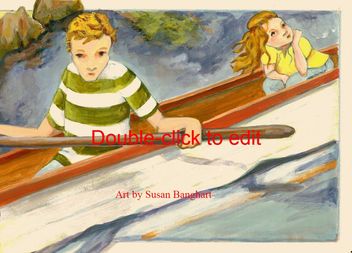 Before readers launch into a literary journey and spend hours and hours reading a story, they must be charmed or fascinated by the protagonist. It helps if the character is funny or feisty. Everyone likes feisty. Feisty faces the world with chin up and eyes blazing. Readers can't wait to see what that character gets up to and they believe whatever she faces, she'll be up to the task. It's tougher to start a story with a protagonist who's downhearted and pessimistic. In her excellent book The Magic Words: Writing Great Books for Children and Young Adults, Cheryl Klein likens the experience to listening to a negative person at a party who goes on and on about their bad luck and how it never changes. Who wants to spend time with that person? She says negative, defeated characters are unappealing. If you start a story with a protagonist who's downhearted, it's vitally important to show they're resilience and assertiveness. Immediately! And humor counts double in this story. So, guess who starts every book with a dispirited, passive person? Yep, that would be me. My muse NEVER imagines characters who wake up on the right side of the bed with a sword drawn to vanquish their enemies. In my critique group The Skyway Writers, my critique partners know I always want their eyes searching for the passages where my character lacks assertiveness. They help me see when she's reacting instead of acting, passive instead of active, finding problems instead of solutions and embracing defeat instead of believing in victory. I think most writers tend to pen protagonists with personalities that echo their own. If you're not a witty and daring optimist, that doesn't mean you can't create appealing characters. You just have to dig deeper, find the parts of you that believe in miracles and have the courage to overcome the most dreadful events. Write the character you hope to become! 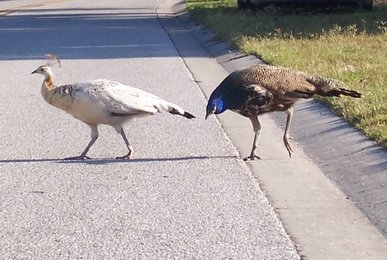 It took many years and hours upon hours of writing and learning to earn a place among The Skyway Writers, the group I share stories with. They're one of the most valuable things in my life, right up there with reliable transportation and groceries. I've met many people who struggle to find compatible writing partners, so one of the things I thought I'd do with my blog this year is share some of the wisdom I glean from my group. This month, the Skyway Writers talked about the need for an active protagonist. It's a subject vitally important to me because I'm an introvert. If I'm not paying attention, I'll start every story with a passive, reactive character. I still remember the moment when I took a synopsis class years ago and the teacher pointed out my character wasn't DOING anything assertive to reach her goal. Oh. You mean, they have to pick up the sword and yell charge? Pretty much. Your protagonist has to drive the story, even if it's a quiet, emotional tale with very little action, and even if they make a wreck of their lives and everyone else's, they have to drive the train. From the onset when they make the decision that sets the story in motion, each decision and action must propel them to the climax and resolution. That's so much easier said than done for someone like me. I try not to let it interfere with writing a first draft but I pay attention to it in every revision and ask my critique partners to keep an eye out for places where my character's not asserting herself. If you don't have a writing partner, don't despair. You can teach yourself to beware of weak protagonists. When you revise, take notes in every scene. Is your main character making decisions that drive the plot or is she merely responding to other characters' decisions and actions? Is she following someone else's lead? If so, it's not a bad idea to look at the leader and ask if maybe it's their story you should be writing. Try a chapter in their point of view. Or go back to chapter one, wind your protagonist up, then buckle on that sword and charge!  I hadn't meant to abandon this blog for seven months but that's how long it's been since I posted. In the spring of 2016 we decided to move back home after living most of our adult lives away. Home was just one county south, but it felt like a new country. Preparing our old house to sell, finding a new home, sorting and packing, shedding everything that wouldn't fit in a much smaller place, moving and then traveling back and forth for months until our prior house sold . . . well, it took much longer and way more energy than I imagined. Now a new year has arrived with fresh hope and perspective. It's strange and wonderful to return to the place where I spent my early days. Everywhere I look are reminders of the sights, sounds and smells that shaped my view of the world. We writers of children's books count on childhood memories to help us relate to our characters. Home is a popular subject in middle grade books. Most of them feature characters searching for a place to belong. In Augusta Scattergood's The Way to Stay in Destiny, Theo fights to stay in a boarding house where he's found friends who understand his love of music and baseball. In J.K. Rowling's Harry Potter series, Harry dreads summers with Aunt Petunia and looks forward to the school year when he can return to his beloved Hogwarts Academy. Bod Owens in Neil Gaiman's The Graveyard Book is adopted by ghosts in a cemetary. The places we grow up weave into the fabric of our souls. If we followed Theo, Harry and Bod into adulthood, we'd see the boarding house in Destiny, Hogwarts Academy and the graveyard playing roles in their lives. We'd see those places call them back. That thread from home, it's always attached. I've lived for so many years in oak-shaded copses, I've forgotten what it's like to be surrounded by the ocean. Here, there's water north, south, east and west. The air smells of salt and gulls cry overhead, reminding me of toes dug into wet sand. I love moss-draped oaks, narrow country lanes and rolling pastures dotted with livestock. I miss seeing cows and horses emerging from early morning mists, rustic barns and sandhill cranes. I've never been a keen boater or swimmer, never longed for life in a city by the sea. But a part of my heart answers back when the ocean calls. Do you have a story, essay, photograph or painting you'd like to share with peers across the country? Teen Ink is a magazine featuring work by teens, and only teens. You can submit throughout the year and they consider every submission for publication. They have contests for Cover Art, Fiction, Nonfiction, Poetry, Educator of the Year (you nominate your favorite teacher), Environmental, Travel and Culture and Community Service. If you're 13 -19, Teen Ink is looking for your writing and art: serious, funny, long or short, they enjoy it all. Be sure to send holiday-themed pieces months ahead of the holiday. Nonfiction winners are published each month in print and online. If your submission is accepted, you receive a free copy of the issue featuring your work and a choice of merchandise from their store. If they accept your stories or art, Teen Ink and its partners and affiliates become the owners, with the non-exclusive right to publish your work in any format, including print, electronic, and online media. That means they can reuse it today or years from today. But you retain the right to submit your work for non-exclusive publication any where and any time you wish. So, if you see another magazine or contest you'd like to submit to, you can. A word of caution: some magazines and contests only accept work that hasn't been previously published. So any time you submit your work, ask yourself if you'll be satisfied with the rewards offered. Being published in a national magazine that's available in classrooms and libraries is a pretty significant accomplishment. If you're interested in making art or writing your career, that publication credit will impress colleges and the people you hope to sell your work to. And every piece of writing or art we share with the world, makes a positive difference. 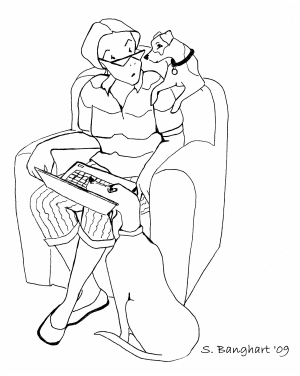 Discipline. No kidding. Yeah, the word has a rigid appearance. If it could speak, it would sound snooty and authoritative, and I doubt it's on anyone's favorite words' list. But it's a tool successful artists and writers count on to get their work done. When I was younger, I believed creativity happened when the muse struck. Like one glorious, spring day, you wake with an idea and an urge that can't be denied, and the work pours from you in an inspired frenzy. I didn't seriously wait for spring, but I did create based on urges. Then I started painting portraits for a living. Deadlines loomed. Payment depended on me producing portraits and the more I produced, the more I got paid. So, I learned to work, every day, three hours in the morning, three in the afternoon. Six hours a day is the magic formula for me. Every artist and writer is different. Author Gary Schmidt writes five hundred words a day, then he stops, no matter how excited he is by the story. Some people are most productive before dawn, some late at night. Some need music, others silence. What's important is finding what works for you and making it a habit. The only way to do that is by honoring your creative time. Put it at the top of your list and guard it fiercely. Don't let other bits of life shove it aside. I know, I know, that's hard to do. Friends are calling and texting and there's always something fun happening. But when your optimum creative window approaches, hide your phone, your iPad, your laptop. Lock yourself in a room with just you and your art. Paint. Write. Even if you're not inspired. It won't be brilliant every day and some days you'll think it's trash. But everything you produce is worth the effort. Every jot leads to the next jot. Award-winning artists and writers don't always love what they do or what they create, but they keep showing up at their desks and easels. Because they know a day will come when what they produce makes them smile from the inside out. Those are the days we live for. 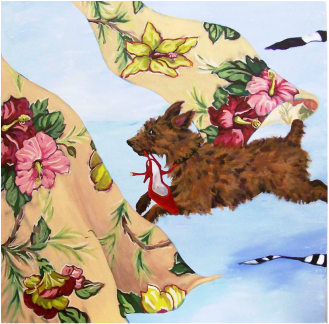 Art by Susan Banghart Art by Susan Banghart I love learning. School learning, book learning, workshops, hand-me-down knowledge, if you're teaching something I'm passionate about, the loading dock in my brain is eager to receive it. Studying craft is vitally important to developing my art and no matter how accomplished I get, I never want to stop growing. But all that learning can interfere with the creative process, especially if you're a perfectionist like me. When the voices in your head won't let you write a sentence without nagging . . . Do you really need that adjective? Shouldn't there be a comma there? You're using the word just again? When you doubt the book before the first draft of the first chapter is written . . . Hasn't this story already been penned by someone who did it brilliantly? My version will never live up to theirs. When messages about syntax, character arcs and pacing interfere with the creative stream, it's time to pack all that learning in a box and shove it behind a locked door in your brain. I've been reading books on writing by James Scott Bell (yes, yes, more learning). He talks about the single most powerful element in good fiction being the joy the writer brings to telling the story. That jolted my artistic heart. I thought about all the books I love, about how from the first word, I feel I'm sitting with a powerful storyteller. Their joy in writing that tale sings from the pages. After reading Bell's words, memories rose of getting so lost while drawing or painting, the world around me disappeared and I'd lose track of time. The first couple years of writing, my stories came like that. Creativity erupted whenever a quiet moment occurred and was stoppered only long enough to take care of life. Then I learned HOW TO WRITE and HOW MUCH I DIDN'T KNOW. All that learning slowly smothered my creativity. So my one and only new year's resolution is to rediscover the joy in my art. It's not easy shutting out lessons once you've learned them. But I'm hoping to do that and if you're feeling stifled, I encourage you to do the same. You can invite those critical voices back when you finish the first draft. They'll be more than happy to help you polish and shine. That's the best part about learning, it's there when you need it. |
AuthorI write middle grade and young adult books with a magical twist, and I'm represented by the fabulous Leslie Zampetti at Open Book Literary. Writer Websites
Augusta Scattergood Maggie Stiefvater Rob Sanders Fred Koehler JC Kato Sarah Aronson Kelly Barnhill Linda Urban Kate DiCamillo Jacqueline Woodson Helpful Links SCBWI Agent Query Lorin Oberweger - Freelance Editor Search BlogArchives
May 2020
Categories
All
|

 RSS Feed
RSS Feed
